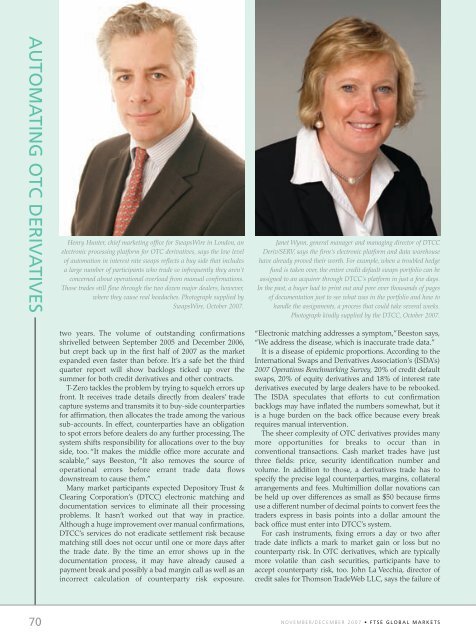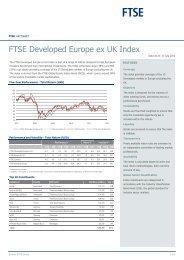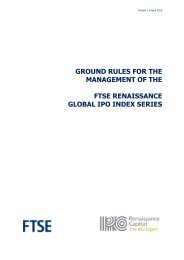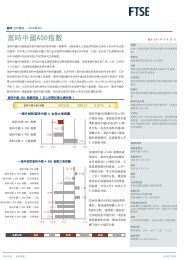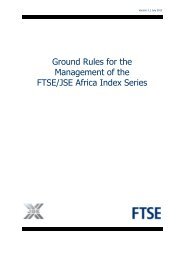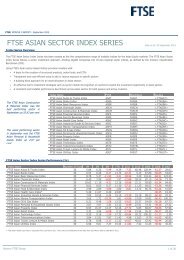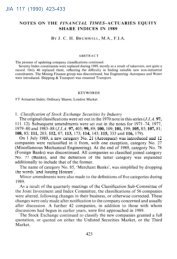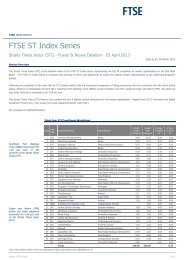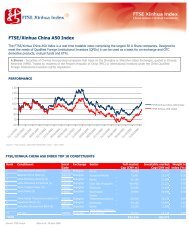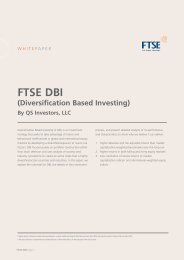Section 2 - FTSE
Section 2 - FTSE
Section 2 - FTSE
Create successful ePaper yourself
Turn your PDF publications into a flip-book with our unique Google optimized e-Paper software.
AUTOMATING OTC DERIVATIVES<br />
70<br />
Henry Hunter, chief marketing office for SwapsWire in London, an<br />
electronic processing platform for OTC derivatives, says the low level<br />
of automation in interest rate swaps reflects a buy side that includes<br />
a large number of participants who trade so infrequently they aren't<br />
concerned about operational overload from manual confirmations.<br />
Those trades still flow through the two dozen major dealers, however,<br />
where they cause real headaches. Photograph supplied by<br />
SwapsWire, October 2007.<br />
two years. The volume of outstanding confirmations<br />
shrivelled between September 2005 and December 2006,<br />
but crept back up in the first half of 2007 as the market<br />
expanded even faster than before. It’s a safe bet the third<br />
quarter report will show backlogs ticked up over the<br />
summer for both credit derivatives and other contracts.<br />
T-Zero tackles the problem by trying to squelch errors up<br />
front. It receives trade details directly from dealers’ trade<br />
capture systems and transmits it to buy-side counterparties<br />
for affirmation, then allocates the trade among the various<br />
sub-accounts. In effect, counterparties have an obligation<br />
to spot errors before dealers do any further processing. The<br />
system shifts responsibility for allocations over to the buy<br />
side, too. “It makes the middle office more accurate and<br />
scalable,” says Beeston, “It also removes the source of<br />
operational errors before errant trade data flows<br />
downstream to cause them.”<br />
Many market participants expected Depository Trust &<br />
Clearing Corporation’s (DTCC) electronic matching and<br />
documentation services to eliminate all their processing<br />
problems. It hasn’t worked out that way in practice.<br />
Although a huge improvement over manual confirmations,<br />
DTCC’s services do not eradicate settlement risk because<br />
matching still does not occur until one or more days after<br />
the trade date. By the time an error shows up in the<br />
documentation process, it may have already caused a<br />
payment break and possibly a bad margin call as well as an<br />
incorrect calculation of counterparty risk exposure.<br />
Janet Wynn, general manager and managing director of DTCC<br />
Deriv/SERV, says the firm's electronic platform and data warehouse<br />
have already proved their worth. For example, when a troubled hedge<br />
fund is taken over, the entire credit default swaps portfolio can be<br />
assigned to an acquirer through DTCC's platform in just a few days.<br />
In the past, a buyer had to print out and pore over thousands of pages<br />
of documentation just to see what was in the portfolio and how to<br />
handle the assignments, a process that could take several weeks.<br />
Photograph kindly supplied by the DTCC, October 2007.<br />
“Electronic matching addresses a symptom,”Beeston says,<br />
“We address the disease, which is inaccurate trade data.”<br />
It is a disease of epidemic proportions. According to the<br />
International Swaps and Derivatives Association’s (ISDA’s)<br />
2007 Operations Benchmarking Survey, 20% of credit default<br />
swaps, 20% of equity derivatives and 18% of interest rate<br />
derivatives executed by large dealers have to be rebooked.<br />
The ISDA speculates that efforts to cut confirmation<br />
backlogs may have inflated the numbers somewhat, but it<br />
is a huge burden on the back office because every break<br />
requires manual intervention.<br />
The sheer complexity of OTC derivatives provides many<br />
more opportunities for breaks to occur than in<br />
conventional transactions. Cash market trades have just<br />
three fields: price, security identification number and<br />
volume. In addition to those, a derivatives trade has to<br />
specify the precise legal counterparties, margins, collateral<br />
arrangements and fees. Multimillion dollar novations can<br />
be held up over differences as small as $50 because firms<br />
use a different number of decimal points to convert fees the<br />
traders express in basis points into a dollar amount the<br />
back office must enter into DTCC’s system.<br />
For cash instruments, fixing errors a day or two after<br />
trade date inflicts a mark to market gain or loss but no<br />
counterparty risk. In OTC derivatives, which are typically<br />
more volatile than cash securities, participants have to<br />
accept counterparty risk, too. John La Vecchia, director of<br />
credit sales for Thomson TradeWeb LLC, says the failure of<br />
NOVEMBER/DECEMBER 2007 • <strong>FTSE</strong> GLOBAL MARKETS


